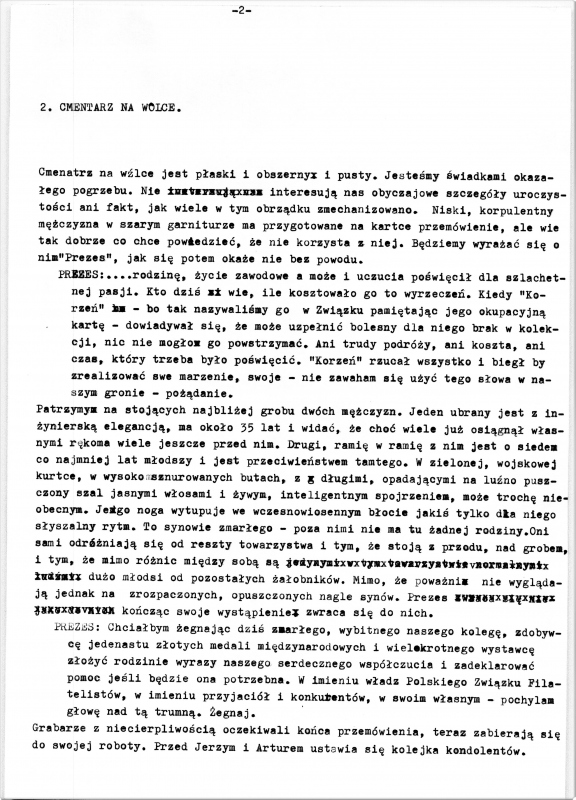Northern Cemetery
The public, non-denominational Northern Cemetery is the biggest burial ground in the city of Warsaw and one of the largest in all of Europe, covering a total area of 143 hectares. The land was set aside in the 1960s at the northern edge of the city and partially in the village of Wołka Węglowa, which is why it is commonly referred to as the “Wólka Cemetery.”
Decalogue Ten
The funeral scene, which was filmed on the largest cemetery in Warsaw (and probably one of the largest in all of Europe), is essentially the start of a story about heirs and inheritance. One of the inspirations for the stories in The Decalogue is The Ten Commandments, a fifteenth-century altarpiece that the co-writer Krzysztof Piesiewicz saw during a school field trip to the National Museum in Warsaw. Years later, he told Kieślowski about the artwork, which illustrates the final commandment with a depiction of mourners in prayer. Next to them are the home and farm of the deceased. Two male relatives of his are seen taking a particular interest in the decedent’s property. They are encouraged to step through the gate by a devil, who holds a banderole bearing the promise that the first man to enter will receive the best cow. The sons of the man buried at the cemetery are played by Jerzy Stuhr and Zbigniew Zamachowski. The two reprise their roles as brothers meeting at a funeral in Krzysztof Kieślowski’s Three Colors: White. Both burial scenes are linked to the theme of human avarice addressed in the films. The coffin lowered into the grave in Decalogue Ten contains the body of Czesław Janicki. The character, played by Bronisław Pawlik, makes only one appearance in the series: in episode eight, he runs into Zofia (the ethics professor) on one of the paths criss-crossing their apartment complex.
Mikołaj Jazdon
The Tenth Commandment:
[You shall not covet…] your neighbor’s house, (…) or anything that belongs to your neighbor.
“(Dis)obedience delayed”
The commandment not to “covet your neighbor’s goods” differs substantially from “You shall not steal.” The robbery in the film is committed by an underground group of stamp collectors, and it is these thieves who break the tenth commandment. But again, it’s not a matter of violated property rights, but their trespassing, the harm they cause to the (arguably illusory) life passions of the two main characters, the brothers Jurek and Artur, and, above all else, to their deceased father, a great collector (“It was his whole life. It would be a crime to let it go to waste,” says a friend of their Father’s). It is a question of passion, not addiction, which we would associate more with meaningless loss ending in fiasco. But to the brothers’ great surprise, they discover that their father had been neglecting them, himself, and everything else for one precious “pearl”: an extraordinary collection.
At this point the sixth commandment comes to the foreground from a somewhat unexpected angle: the sons reject the “honor” they owed their father when he stopped “honoring” them and became absent from their lives, a stranger. Now the brothers sincerely “honor their father” by taking over not just his stamp collection, but also his passion for philately, as if part of an unwritten will. In doing so, they unwittingly “honor” their father and show him (delayed) obedience. The sons find themselves succumbing to the consequences of their newfound passion: now it is they who neglect their own family (Jurek) and art (Artur). Artur, a beloved singer, barks the lyrics to a song that bookends the beginning and end of the film: a song about desire; against all Ten Commandments!
This episode is exceptional in that Kieślowski does not send the Angel/Barciś to observe the characters. The Angel already seemed a bit lost in Decalogue Nine; desire is the domain of humans, not Angels. It leads people (and Angels, in the Book of Genesis) to their downfall. But it also leads them to art.
